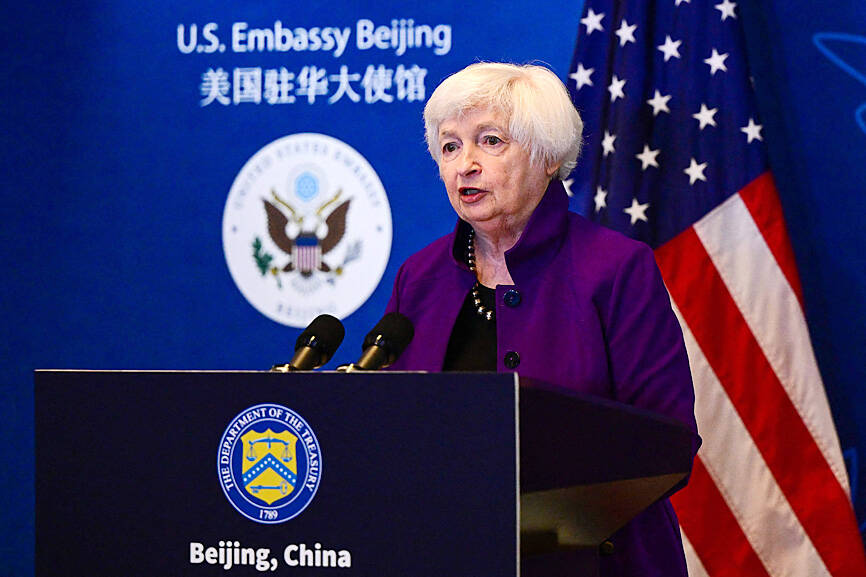US Treasury Secretary Janet Yellen yesterday said 10 hours of meetings with senior Chinese officials over the past few days were “direct” and “productive,” helping to stabilize the superpowers’ often rocky relationship as her four-day Beijing trip ended.
Before departing China, Yellen said Washington and Beijing remained at odds on a number of issues, but expressed confidence that her visit had advanced efforts to put the relationship on “surer footing.”
“The US and China have significant disagreements,” Yellen told a news conference at the US embassy in Beijing, citing Washington’s concerns about what she called “unfair economic practices” and recent punitive actions against US firms.

Photo: AFP
“But [US] President [Joe] Biden and I do not see the relationship between the US and China through the frame of great power conflict. We believe that the world is big enough for both of our countries to thrive,” she said.
With US-China relations at a low over national security issues, including Taiwan, US export bans on advanced technologies and China’s state-led industrial policies, Washington has been trying to repair ties between the world’s two biggest economies.
US Secretary of State Antony Blinken visited Beijing last month, the first trip by the top US diplomat during Biden’s presidency. US Special Presidential Envoy for Climate John Kerry is expected to visit this month.
Yellen said her visit aimed to establish and deepen ties with China’s new economic team, reduce the risk of misunderstanding and pave the way for cooperation in areas such as climate change and debt distress.
“I do think we’ve made some progress, and I think we can have a healthy economic relationship that benefits both of us and the world,” she said, adding that she expected increased and more regular communications at the staff level.
Briefing reporters after the visit, a senior US Department of the Treasury official said the trip as expected did not result in specific policy breakthroughs, but was “very successful” in terms of “re-establishing contact” and building relationships.
She said that Chinese officials raised concerns about an expected US executive order restricting outbound investment, but she assured them any such measure would be narrow in scope and enacted in a transparent way.
She reiterated that Washington was not seeking to decouple from China’s economy, as doing so would be “disastrous for both countries and destabilizing for the world.”

CHAOS: Iranians took to the streets playing celebratory music after reports of Khamenei’s death on Saturday, while mourners also gathered in Tehran yesterday Iranian Supreme Leader Ayatollah Ali Khamenei was killed in a major attack on Iran launched by Israel and the US, throwing the future of the Islamic republic into doubt and raising the risk of regional instability. Iranian state television and the state-run IRNA news agency announced the 86-year-old’s death early yesterday. US President Donald Trump said it gave Iranians their “greatest chance” to “take back” their country. The announcements came after a joint US and Israeli aerial bombardment that targeted Iranian military and governmental sites. Trump said the “heavy and pinpoint bombing” would continue through the week or as long

TRUST: The KMT said it respected the US’ timing and considerations, and hoped it would continue to honor its commitments to helping Taiwan bolster its defenses and deterrence US President Donald Trump is delaying a multibillion-dollar arms sale to Taiwan to ensure his visit to Beijing is successful, a New York Times report said. The weapons sales package has stalled in the US Department of State, the report said, citing US officials it did not identify. The White House has told agencies not to push forward ahead of Trump’s meeting with Chinese President Xi Jinping (習近平), it said. The two last month held a phone call to discuss trade and geopolitical flashpoints ahead of the summit. Xi raised the Taiwan issue and urged the US to handle arms sales to

BIG SPENDERS: Foreign investors bought the most Taiwan equities since 2005, signaling confidence that an AI boom would continue to benefit chipmakers Taiwan Semiconductor Manufacturing Co’s (TSMC, 台積電) market capitalization swelled to US$2 trillion for the first time following a 4.25 percent rally in its American depositary receipts (ADR) overnight, putting the world’s biggest contract chipmaker sixth on the list of the world’s biggest companies by market capitalization, just behind Amazon.com Inc. The site CompaniesMarketcap.com ranked TSMC ahead of Saudi Aramco and Meta Platforms Inc. The Taiwanese company’s ADRs on Tuesday surged to US$385.75 on the New York Stock Exchange, as strong demand for artificial intelligence (AI) applications led to chip supply constraints and boost revenue growth to record-breaking levels. Each TSMC ADR represents

Pro-democracy media tycoon Jimmy Lai’s (黎智英) fraud conviction and prison sentence were yesterday overturned by a Hong Kong court, in a surprise legal decision that comes soon after Lai was jailed for 20 years on a separate national security charge. Judges Jeremy Poon (潘兆初), Anthea Pang (彭寶琴) and Derek Pang (彭偉昌) said in the judgement that they allowed the appeal from Lai, and another defendant in the case, to proceed, as a lower court judge had “erred.” “The Court of Appeal gave them leave to appeal against their conviction, allowed their appeals, quashed the convictions and set aside the sentences,” the judges